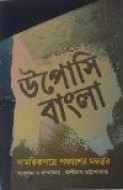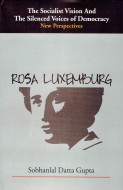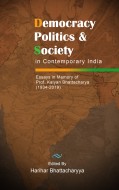Search results for 'van cleef'
-

Uposi Bangla : Samayikpatre Panchaser Manvanantar
Author: Kashinath Chattopadhyay
₹300.00Uposi Bangla : Samayikpatre Panchaser Manvanantar Learn More -

Nationalism in Bengal- a study of cultural conflict towards british racial imposition
Author: Kamala Sarkar
₹395.00In the 1857 Rising the war was lost but the seeds of a nation was sown on the battleground. The year long events encompassing the northern and the central part of the Indian subcontinent witnessed the fluctuating fortunes of the conqueror and the vanquished, the sepoys’defiance and the white rulers’ rage and revenge. Bengal was geographically far from the centres of combat and violence but the Bengalis with their deskjob skill were found in abound in the entire northern belt. They dreaded the nightmare of lawlessness of the previous regime and initially applauded the British victory. But the Rising broke the mutual trust, the English turned more racist and the Queen’s announcement rested in the paper. The middle class Bengali got little share in the administration or their land, low paid jobs and faced hundreds of discrimination. The egoistic Bengali fumed but could not revolt owing to his racial disabilities. He could not help saluting the unlettered rustic sepoys’ undaunted front. A new brand of nationalism emerged upon love of motherland. The Bengali literary stalwarts ventured patriotic writings in vernacular, the Bengali stage carried it among the common folk and the folk entertainers spread it to remotest corner. This book tells of those narratives reflecting cultural reversal. Learn More -

The Socialist Vision And The Silenced Voices of Democracy- New Perspectives - : ROSA LUXEMBURG
Author: Sobhanlal Datta Gupta
₹495.00Rosa Luxemburg whom Franz Mehring called “the best brain after Marx in socialist movement” after the death of Marx remained protractedly maligned for over half a century by Josef Stalin and his sidekicks in the Russian Social Democratic Labour Party — subsequently rechristened as the Communist Party of Soviet Union (Bolshevik) and thereafter CPSU — was the ‘ideologue’ of “Luxemburgism” and counter-revolutionary strain of Menshevism. Dr William A Pelz blasted “Luxemburgism “ as “clumsy, cynical and self- serving parody on the ideas of Rosa Luxemburg” at the International Rosa Luxemburg Conference — Internationale Rosa-Luxemburg-Gesellschaft (IRLS) — in Tokyo (April 2007). It was the sixth such conference. The first such meet took place in Chicago in 1998. Last year, Seoul was the venue of the IRLC which is organised by the International Rosa Luxemburg Society (IRLS) that aims at demolition of tendentious ‘Luxemburgism’ and restoration of theoretical and practical struggle, initiated by Luxemburg. The rediscovery of Luxemburg — Another Luxemburgism is possible: Reflections on Rosa and the Radical Socialist Project, the title of Dr Pelz’s paper — could be congenial after the fall of ‘Official Marxism’ (sadly with the fall of Soviet Union). Dr Sobhanlal Datta Gupta, formerly Surendranath Banerjee Chair of political science, University of Calcutta, who has attended every IRLS since 1998 and an internationally reputed research scholar on the international communist movement, has done yet another commendable work, The Socialist Vision and The Silenced Voices of Democracy — New Perspectives — Part I, Rosa Luxemburg (Seriban, Bakhrahat, South 24 Parganas district, West Bengal, Rs495), a 137-page book, packed with reference to source materials which will help scholars engaged in research on Luxemburg. Gupta is at work for the next two books under this series: one on Nikolai Bukharin and another on György Lukács. “Freedom” Luxemburg wrote famously in the Marxian spirit, “is always the freedom of those who think differently”. Unlike Bolsheviks, including Lenin, she had stuck unflinchingly to the ‘Hegelian-Marxian’ trait in contrast to ‘ultra-centralism’ of RSDLP, the ruling party (after the Bolshevik Revolution) under Lenin. She did her best to rid ‘Marxism’ or Marxian temper of what Robert Locker described as ‘organisational fetishism’, leading to ossification of the RSDLP due to ‘purely mechanistic fashion’ of running the party and the governmental power during Lenin’s lifetime. Luxemburg was compelled to criticise Lenin’s (Trotsky’s too) ‘organisational centralism’. She differed profoundly with Lenin’s aberrant experiment of vanguard role of the party that Marx never prescribed. Gupta’s advantage was his almost six month research at the archive of the Communist International (Third International or Comintern) in Moscow after it was declassified during the last years of Gorbachev era. He published a seminal work, Comintern and the Destiny of Communism in India — Dialectics of Real and Possible History, which was translated into German and Malayalam. The present treatise is split into six sequentially built chapters: New Historiography, Vision of Socialism and Democracy and Spontaneity contra Centralism of Luxemburg, Internationalism of Communism and Destiny of Rosa Luxemburg and Rosa Luxemburg and the World Today. His identification of Rosa as ‘ a heretic, a revolutionary with a difference and so remained a constant threat to all those who felt it safe not to question the claims of official Marxism’ guides a reader to understand the meaning of Dr Pelz’s paper ‘Another Luxemburgism is possible’. Her real name was Rozalia Luksenburg, born in 1871, into a Polish family of secular Jews in a small city in Russian-occupied Poland. How brutally she was killed on January 15, 1919, as a sequel to the abortive bid of her party Independent Socialist Party of Germany (USPD) to overthrow the Ebert-Scheidemann government is well known. Stalin embarked on abusive vilification of her theoretical contributions 12 years thereafter through his infamous letter ‘On Some Questions Concerning the History of Bolshevism’, published in Proletarskaia Revoliutsiia (1931). He blamed Rosa for ‘counterrevolutionary Menshevism’, a tendentious accusation. Instantaneously, Leon Trotsky, Stalin’s enemy number one, lashed out at him with a sharp polemical essay, Hands off Rosa Luxemburg. The wilful abuse against Luxemburg remained unchanged even after the Stalin period. Which was why Annelies Laschitza, the outstanding biographer of Luxemburg, had to submit the manuscript within the bureaucratic frame, set out by the central committee of erstwhile Socialist Unity Party of now-defunct German Democratic Republic, although she and Gunter Radczuan jointly headed the project for Rosa’s biography. “From her own testimony it is now evident that there were vast gaps, distortions, if not falsifications, in the name of Leninism”, noted Gupta. Laschitza’s keynote address, Encountering Rosa Luxemburg-Past and Present, at a symposium, organised by the Berlin-based Institute of History of Working Class in March 1989 is ‘a fascinating analysis’, he adds. Laschitza criticised Lenin for loose comments on the great revolutionary in his Notes of a Publicist’( November 1922), ‘without actually reading it’. Gupta’s paper Understanding Socialism as Hegemony: Rosa Luxemburg and Nikolai Bukharin at the Tokyo conference of IRLS (2007) is an original contribution. Bukharin was closer to Luxemburg than Antonio Gramsci and György Lukács, Gupta observed. Bukharin wrote poignantly: “A static and tranquillised attitude is a trait that grows out of parasitism… The active and creative quality of socialist culture results in an ever-renewed growth of both material and spiritual needs, in which the latter develop into actual passions”. Bukharin thought of ‘new man’ in socialist or communist society like Rosa. Official Marxism never thought alike. However, the new revelations about Luxemberg are mostly in German. Out of her 900-plus letters, edited by Laschitza, Georg Adler and, Peter Hudis, less than 250 have been translated into English. We hope IRLS will look into the matter. Learn More -

Parisankhyane Paschimbanger Nagarjivan
Author: Sachchidananda Datta Ray
₹125.00Parisankhyane Paschimbanger Nagarjivan Learn More -

-

Rabindranath Tagore-On Art Artists and Aesthetics
Author: Supriya Roy
₹395.00Supriya Roy has worked in Rabindra-Bhavana, the Tagore Memorial Museum, Archives and Research Centre of Visva-Bharati, Santiniketan as a librarian and archivist for three decades. The Content Writer of Multimedia Encyclopedia on Tagore, her publications include, Rabindra-Bhavana Uttarayana: an introduction, Tagoreana in the Modern Review, Makers of a Mission; she has been series editor for the Tagore Travelogues for Visva-Bharati and has edited: Letters from a Sojourner in Europe; Journey to Persia and Iraq: 1932; Letters from Java: Rabindranath Tagore’s Tour of Southeast Asia and Talks in Japan, A Home in Urbana, and The Diaries of Rathindranath Tagore. With Sushobhan Adhikary, she has written Rabindranath Tagore: His World of Art.
Smt.Roy has curated exhibitions on Rabindranath in various places. In 2007, she organized a permanent gallery on the life and works of Rabindranath in Mauritius. In 2011, she curated an exhibition on Rabindranath in Kuala Lumpur. Other (ICCR) exhibitions which have travelled all over the world are: Rabindranath Tagore and the Romance of Travel, Rabindranath Tagore: Pilgrimages to the East and Rabindranath Tagore: An Encounter with Japan.
Learn More -

Democracy, Politics and Society in Contemporary India
Author: Edited by Professor Harihar Bhattacharyya, PhD (LSE)
₹700.00More people live with electoral democracy in India than in Europe and the US combined. If we are to understand democracy as a form of government, with its successes and failures, its ability to create peace and development or its ability to falter, create division and give rise to majoritarianism, authoritarian leaders or identitarian movements, we need to understand democracy in India. This intellectually engaging collection of articles is a valued contribution to this endeavour because it challenges us to investigate democracy as an ongoing process, its final goal never defined. The collection has profound lessons not just for understanding India’s democracy but for democracy, political legitimacy and societal capacity world-wide. Arild Engelsen Ruud University of Oslo Contents Preface and acknowledgments List of Tables List of Figures Notes on Contributors Harihar Bhattacharyya: Introduction: Democracy, More Questions, Few Answers Chapter 1 Subrata K Mitra: Citizenship in India: the puzzling resilience of an imported concept Chapter 2 Sudipta Kaviraj: Two Concepts of Democracy and the Left in West Bengal Chapter 3 Sobhanlal Datta Gupta: Revisioning the Left in today's India : Towards an alternative understanding Chapter 4 Surajit Ch. Mukhopadhyay: The Right and the Left: Contemporary India and the crises in Indian Democracy Chapter 5 Kaushik Bhattacharya: Independent Candidates in Lok Sabha Elections Chapter 6 Sumantra Bhattacharya: Political Marketing in India: How Political Parties in India Make Use of the Marketing Tools Chapter 7 Sukanta Bhattacharyya: Limits of Positive Discrimination in India’s Localities: Does it signal a failure of India’s Democracy? Chapter 8 Bibhas Bagchi: For a Radical Democracy: Understanding and Contesting Hierarchies in India Chapter 9 Syeda Layla Khaled: Muslim Women in India: Between Democratic Citizenship and Muslim Identity Chapter 10 Abhisek Karmakar: The Making of India’s Democracy Discourse: Contributions of Dwarakanath Vidyabhusan Chapter 11 Sahon Bhattacharyya:Reappraising the value of the traditional: Indian social ontology beyond the Western episteme Chapter 12 Joyjit Ghosh: Symptomatic Politics, Asymptomatic Media in India Chapter 13 Harihar Bhattacharyya: Indian Democracy’s Civil and Political Society: A critique of Partha Chatterjee Appendices 1. Jyotirmay Bhattacharya: A short Biography of late Kalyan K Bhattacharya 2. Kalyani Bhattacharyya: Kalyan Bhattacharya: A Reminiscence 3. Writings of Kalyan Bhattacharyya: (re-reprinted) a. Sociology of Inequalities: Bankim Chandra’s Essay on Samya (1992) (pp. 85-107) Journal of Socio-Political Studies, Vol 1, 1992. b. Bhudev and Modernity: Nationalism and Beyond (2007) (pp. 30-45) Index Learn More

